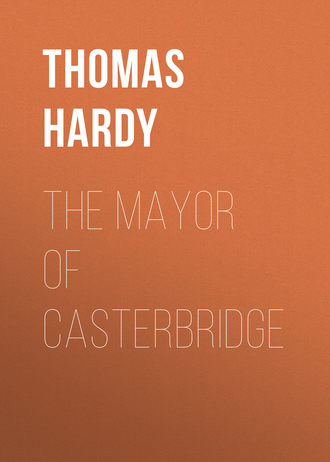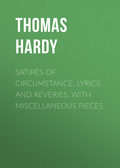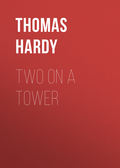
Томас Харди (Гарди)
The Mayor of Casterbridge
27
It was the eve of harvest. Prices being low Farfrae was buying. As was usual, after reckoning too surely on famine weather the local farmers had flown to the other extreme, and (in Farfrae’s opinion) were selling off too recklessly – calculating with just a trifle too much certainty upon an abundant yield. So he went on buying old corn at its comparatively ridiculous price: for the produce of the previous year, though not large, had been of excellent quality.
When Henchard had squared his affairs in a disastrous way, and got rid of his burdensome purchases at a monstrous loss, the harvest began. There were three days of excellent weather, and then – “What if that curst conjuror should be right after all!” said Henchard.
The fact was, that no sooner had the sickles begun to play than the atmosphere suddenly felt as if cress would grow in it without other nourishment. It rubbed people’s cheeks like damp flannel when they walked abroad. There was a gusty, high, warm wind; isolated raindrops starred the window-panes at remote distances: the sunlight would flap out like a quickly opened fan, throw the pattern of the window upon the floor of the room in a milky, colourless shine, and withdraw as suddenly as it had appeared.
From that day and hour it was clear that there was not to be so successful an ingathering after all. If Henchard had only waited long enough he might at least have avoided loss though he had not made a profit. But the momentum of his character knew no patience. At this turn of the scales he remained silent. The movements of his mind seemed to tend to the thought that some power was working against him.
“I wonder,” he asked himself with eerie misgiving; “I wonder if it can be that somebody has been roasting a waxen image of me, or stirring an unholy brew to confound me! I don’t believe in such power; and yet – what if they should ha’ been doing it!” Even he could not admit that the perpetrator, if any, might be Farfrae. These isolated hours of superstition came to Henchard in time of moody depression, when all his practical largeness of view had oozed out of him.
Meanwhile Donald Farfrae prospered. He had purchased in so depressed a market that the present moderate stiffness of prices was sufficient to pile for him a large heap of gold where a little one had been.
“Why, he’ll soon be Mayor!” said Henchard. It was indeed hard that the speaker should, of all others, have to follow the triumphal chariot of this man to the Capitol.
The rivalry of the masters was taken up by the men.
September-night shades had fallen upon Casterbridge; the clocks had struck half-past eight, and the moon had risen. The streets of the town were curiously silent for such a comparatively early hour. A sound of jangling horse-bells and heavy wheels passed up the street. These were followed by angry voices outside Lucetta’s house, which led her and Elizabeth-Jane to run to the windows, and pull up the blinds.
The neighbouring Market House and Town Hall abutted against its next neighbour the Church except in the lower storey, where an arched thoroughfare gave admittance to a large square called Bull Stake. A stone post rose in the midst, to which the oxen had formerly been tied for baiting with dogs to make them tender before they were killed in the adjoining shambles. In a corner stood the stocks.
The thoroughfare leading to this spot was now blocked by two four-horse waggons and horses, one laden with hay-trusses, the leaders having already passed each other, and become entangled head to tail. The passage of the vehicles might have been practicable if empty; but built up with hay to the bedroom windows as one was, it was impossible.
“You must have done it a’ purpose!” said Farfrae’s waggoner. “You can hear my horses’ bells half-a-mile such a night as this!”
“If ye’d been minding your business instead of zwailing along in such a gawk-hammer way, you would have zeed me!” retorted the wroth representative of Henchard.
However, according to the strict rule of the road it appeared that Henchard’s man was most in the wrong, he therefore attempted to back into the High Street. In doing this the near hind-wheel rose against the churchyard wall and the whole mountainous load went over, two of the four wheels rising in the air, and the legs of the thill horse.
Instead of considering how to gather up the load the two men closed in a fight with their fists. Before the first round was quite over Henchard came upon the spot, somebody having run for him.
Henchard sent the two men staggering in contrary directions by collaring one with each hand, turned to the horse that was down, and extricated him after some trouble. He then inquired into the circumstances; and seeing the state of his waggon and its load began hotly rating Farfrae’s man.
Lucetta and Elizabeth-Jane had by this time run down to the street corner, whence they watched the bright heap of new hay lying in the moon’s rays, and passed and repassed by the forms of Henchard and the waggoners. The women had witnessed what nobody else had seen – the origin of the mishap; and Lucetta spoke.
“I saw it all, Mr. Henchard,” she cried; “and your man was most in the wrong!”
Henchard paused in his harangue and turned. “Oh, I didn’t notice you, Miss Templeman,” said he. “My man in the wrong? Ah, to be sure; to be sure! But I beg your pardon notwithstanding. The other’s is the empty waggon, and he must have been most to blame for coming on.”
“No; I saw it, too,” said Elizabeth-Jane. “And I can assure you he couldn’t help it.”
“You can’t trust THEIR senses!” murmured Henchard’s man.
“Why not?” asked Henchard sharply.
“Why, you see, sir, all the women side with Farfrae – being a damn young dand – of the sort that he is – one that creeps into a maid’s heart like the giddying worm into a sheep’s brain – making crooked seem straight to their eyes!”
“But do you know who that lady is you talk about in such a fashion? Do you know that I pay my attentions to her, and have for some time? Just be careful!”
“Not I. I know nothing, sir, outside eight shillings a week.”
“And that Mr. Farfrae is well aware of it? He’s sharp in trade, but he wouldn’t do anything so underhand as what you hint at.”
Whether because Lucetta heard this low dialogue, or not her white figure disappeared from her doorway inward, and the door was shut before Henchard could reach it to converse with her further. This disappointed him, for he had been sufficiently disturbed by what the man had said to wish to speak to her more closely. While pausing the old constable came up.
“Just see that nobody drives against that hay and waggon to-night, Stubberd,” said the corn-merchant. “It must bide till the morning, for all hands are in the field still. And if any coach or road-waggon wants to come along, tell ‘em they must go round by the back street, and be hanged to ‘em…Any case tomorrow up in Hall?”
“Yes, sir. One in number, sir.”
“Oh, what’s that?”
“An old flagrant female, sir, swearing and committing a nuisance in a horrible profane manner against the church wall, sir, as if ‘twere no more than a pot-house! That’s all, sir.”
“Oh. The Mayor’s out o’ town, isn’t he?”
“He is, sir.”
“Very well, then I’ll be there. Don’t forget to keep an eye on that hay. Good night t’ ‘ee.”
During those moments Henchard had determined to follow up Lucetta notwithstanding her elusiveness, and he knocked for admission.
The answer he received was an expression of Miss Templeman’s sorrow at being unable to see him again that evening because she had an engagement to go out.
Henchard walked away from the door to the opposite side of the street, and stood by his hay in a lonely reverie, the constable having strolled elsewhere, and the horses being removed. Though the moon was not bright as yet there were no lamps lighted, and he entered the shadow of one of the projecting jambs which formed the thoroughfare to Bull Stake; here he watched Lucetta’s door.
Candle-lights were flitting in and out of her bedroom, and it was obvious that she was dressing for the appointment, whatever the nature of that might be at such an hour. The lights disappeared, the clock struck nine, and almost at the moment Farfrae came round the opposite corner and knocked. That she had been waiting just inside for him was certain, for she instantly opened the door herself. They went together by the way of a back lane westward, avoiding the front street; guessing where they were going he determined to follow.
The harvest had been so delayed by the capricious weather that whenever a fine day occurred all sinews were strained to save what could be saved of the damaged crops. On account of the rapid shortening of the days the harvesters worked by moonlight. Hence to-night the wheat-fields abutting on the two sides of the square formed by Casterbridge town were animated by the gathering hands. Their shouts and laughter had reached Henchard at the Market House, while he stood there waiting, and he had little doubt from the turn which Farfrae and Lucetta had taken that they were bound for the spot.
Nearly the whole town had gone into the fields. The Casterbridge populace still retained the primitive habit of helping one another in time of need; and thus, though the corn belonged to the farming section of the little community – that inhabiting the Durnover quarter – the remainder was no less interested in the labour of getting it home.
Reaching the top of the lane Henchard crossed the shaded avenue on the walls, slid down the green rampart, and stood amongst the stubble. The “stitches” or shocks rose like tents about the yellow expanse, those in the distance becoming lost in the moonlit hazes.
He had entered at a point removed from the scene of immediate operations; but two others had entered at that place, and he could see them winding among the shocks. They were paying no regard to the direction of their walk, whose vague serpentining soon began to bear down towards Henchard. A meeting promised to be awkward, and he therefore stepped into the hollow of the nearest shock, and sat down.
“You have my leave,” Lucetta was saying gaily. “Speak what you like.”
“Well, then,” replied Farfrae, with the unmistakable inflection of the lover pure, which Henchard had never heard in full resonance of his lips before, “you are sure to be much sought after for your position, wealth, talents, and beauty. But will ye resist the temptation to be one of those ladies with lots of admirers – ay – and be content to have only a homely one?”
“And he the speaker?” said she, laughing. “Very well, sir, what next?”
“Ah! I’m afraid that what I feel will make me forget my manners!”
“Then I hope you’ll never have any, if you lack them only for that cause.” After some broken words which Henchard lost she added, “Are you sure you won’t be jealous?”
Farfrae seemed to assure her that he would not, by taking her hand.
“You are convinced, Donald, that I love nobody else,” she presently said. “But I should wish to have my own way in some things.”
“In everything! What special thing did you mean?”
“If I wished not to live always in Casterbridge, for instance, upon finding that I should not be happy here?”
Henchard did not hear the reply; he might have done so and much more, but he did not care to play the eavesdropper. They went on towards the scene of activity, where the sheaves were being handed, a dozen a minute, upon the carts and waggons which carried them away.
Lucetta insisted on parting from Farfrae when they drew near the workpeople. He had some business with them, and, though he entreated her to wait a few minutes, she was inexorable, and tripped off homeward alone.
Henchard thereupon left the field and followed her. His state of mind was such that on reaching Lucetta’s door he did not knock but opened it, and walked straight up to her sitting-room, expecting to find her there. But the room was empty, and he perceived that in his haste he had somehow passed her on the way hither. He had not to wait many minutes, however, for he soon heard her dress rustling in the hall, followed by a soft closing of the door. In a moment she appeared.
The light was so low that she did not notice Henchard at first. As soon as she saw him she uttered a little cry, almost of terror.
“How can you frighten me so?” she exclaimed, with a flushed face. “It is past ten o’clock, and you have no right to surprise me here at such a time.”
“I don’t know that I’ve not the right. At any rate I have the excuse. Is it so necessary that I should stop to think of manners and customs?”
“It is too late for propriety, and might injure me.”
“I called an hour ago, and you would not see me, and I thought you were in when I called now. It is you, Lucetta, who are doing wrong. It is not proper in ‘ee to throw me over like this. I have a little matter to remind you of, which you seem to forget.”
She sank into a chair, and turned pale.
“I don’t want to hear it – I don’t want to hear it!” she said through her hands, as he, standing close to the edge of her gown, began to allude to the Jersey days.
“But you ought to hear it,” said he.
“It came to nothing; and through you. Then why not leave me the freedom that I gained with such sorrow! Had I found that you proposed to marry me for pure love I might have felt bound now. But I soon learnt that you had planned it out of mere charity – almost as an unpleasant duty – because I had nursed you, and compromised myself, and you thought you must repay me. After that I did not care for you so deeply as before.”
“Why did you come here to find me, then?”
“I thought I ought to marry you for conscience’ sake, since you were free, even though I – did not like you so well.”
“And why then don’t you think so now?”
She was silent. It was only too obvious that conscience had ruled well enough till new love had intervened and usurped that rule. In feeling this she herself forgot for the moment her partially justifying argument – that having discovered Henchard’s infirmities of temper, she had some excuse for not risking her happiness in his hands after once escaping them. The only thing she could say was, “I was a poor girl then; and now my circumstances have altered, so I am hardly the same person.”
“That’s true. And it makes the case awkward for me. But I don’t want to touch your money. I am quite willing that every penny of your property shall remain to your personal use. Besides, that argument has nothing in it. The man you are thinking of is no better than I.”
“If you were as good as he you would leave me!” she cried passionately.
This unluckily aroused Henchard. “You cannot in honour refuse me,” he said. “And unless you give me your promise this very night to be my wife, before a witness, I’ll reveal our intimacy – in common fairness to other men!”
A look of resignation settled upon her. Henchard saw its bitterness; and had Lucetta’s heart been given to any other man in the world than Farfrae he would probably have had pity upon her at that moment. But the supplanter was the upstart (as Henchard called him) who had mounted into prominence upon his shoulders, and he could bring himself to show no mercy.
Without another word she rang the bell, and directed that Elizabeth-Jane should be fetched from her room. The latter appeared, surprised in the midst of her lucubrations. As soon as she saw Henchard she went across to him dutifully.
“Elizabeth-Jane,” he said, taking her hand, “I want you to hear this.” And turning to Lucetta: “Will you, or will you not, marry me?
“If you – wish it, I must agree!”
“You say yes?”
“I do.”
No sooner had she given the promise than she fell back in a fainting state.
“What dreadful thing drives her to say this, father, when it is such a pain to her?” asked Elizabeth, kneeling down by Lucetta. “Don’t compel her to do anything against her will! I have lived with her, and know that she cannot bear much.”
“Don’t be a no’thern simpleton!” said Henchard drily. “This promise will leave him free for you, if you want him, won’t it?”
At this Lucetta seemed to wake from her swoon with a start.
“Him? Who are you talking about?” she said wildly.
“Nobody, as far as I am concerned,” said Elizabeth firmly.
“Oh – well. Then it is my mistake,” said Henchard. “But the business is between me and Miss Templeman. She agrees to be my wife.”
“But don’t dwell on it just now,” entreated Elizabeth, holding Lucetta’s hand.
“I don’t wish to, if she promises,” said Henchard.
“I have, I have,” groaned Lucetta, her limbs hanging like fluid, from very misery and faintness. “Michael, please don’t argue it any more!”
“I will not,” he said. And taking up his hat he went away.
Elizabeth-Jane continued to kneel by Lucetta. “What is this?” she said. “You called my father ‘Michael’ as if you knew him well? And how is it he has got this power over you, that you promise to marry him against your will? Ah – you have many many secrets from me!”
“Perhaps you have some from me,” Lucetta murmured with closed eyes, little thinking, however, so unsuspicious was she, that the secret of Elizabeth’s heart concerned the young man who had caused this damage to her own.
“I would not – do anything against you at all!” stammered Elizabeth, keeping in all signs of emotion till she was ready to burst. “I cannot understand how my father can command you so; I don’t sympathize with him in it at all. I’ll go to him and ask him to release you.”
“No, no,” said Lucetta. “Let it all be.”
28
The next morning Henchard went to the Town Hall below Lucetta’s house, to attend Petty Sessions, being still a magistrate for the year by virtue of his late position as Mayor. In passing he looked up at her windows, but nothing of her was to be seen.
Henchard as a Justice of the Peace may at first seem to be an even greater incongruity than Shallow and Silence themselves. But his rough and ready perceptions, his sledge-hammer directness, had often served him better than nice legal knowledge in despatching such simple business as fell to his hands in this Court. To-day Dr. Chalkfield, the Mayor for the year, being absent, the corn-merchant took the big chair, his eyes still abstractedly stretching out of the window to the ashlar front of High-Place Hall.
There was one case only, and the offender stood before him. She was an old woman of mottled countenance, attired in a shawl of that nameless tertiary hue which comes, but cannot be made – a hue neither tawny, russet, hazel, nor ash; a sticky black bonnet that seemed to have been worn in the country of the Psalmist where the clouds drop fatness; and an apron that had been white in time so comparatively recent as still to contrast visibly with the rest of her clothes. The steeped aspect of the woman as a whole showed her to be no native of the country-side or even of a country-town.
She looked cursorily at Henchard and the second magistrate, and Henchard looked at her, with a momentary pause, as if she had reminded him indistinctly of somebody or something which passed from his mind as quickly as it had come. “Well, and what has she been doing?” he said, looking down at the charge sheet.
“She is charged, sir, with the offence of disorderly female and nuisance,” whispered Stubberd.
“Where did she do that?” said the other magistrate.
“By the church, sir, of all the horrible places in the world! – I caught her in the act, your worship.”
“Stand back then,” said Henchard, “and let’s hear what you’ve got to say.”
Stubberd was sworn in, the magistrate’s clerk dipped his pen, Henchard being no note-taker himself, and the constable began —
“Hearing a’ illegal noise I went down the street at twenty-five minutes past eleven P.M. on the night of the fifth instinct, Hannah Dominy. When I had —
“Don’t go so fast, Stubberd,” said the clerk.
The constable waited, with his eyes on the clerk’s pen, till the latter stopped scratching and said, “yes.” Stubberd continued: “When I had proceeded to the spot I saw defendant at another spot, namely, the gutter.” He paused, watching the point of the clerk’s pen again.
“Gutter, yes, Stubberd.”
“Spot measuring twelve feet nine inches or thereabouts from where I – ” Still careful not to outrun the clerk’s penmanship Stubberd pulled up again; for having got his evidence by heart it was immaterial to him whereabouts he broke off.
“I object to that,” spoke up the old woman, “‘spot measuring twelve feet nine or thereabouts from where I,’ is not sound testimony!”
The magistrates consulted, and the second one said that the bench was of opinion that twelve feet nine inches from a man on his oath was admissible.
Stubberd, with a suppressed gaze of victorious rectitude at the old woman, continued: “Was standing myself. She was wambling about quite dangerous to the thoroughfare and when I approached to draw near she committed the nuisance, and insulted me.”
“‘Insulted me.’…Yes, what did she say?”
“She said, ‘Put away that dee lantern,’ she says.”
“Yes.”
“Says she, ‘Dost hear, old turmit-head? Put away that dee lantern. I have floored fellows a dee sight finer-looking than a dee fool like thee, you son of a bee, dee me if I haint,’ she says.
“I object to that conversation!” interposed the old woman. “I was not capable enough to hear what I said, and what is said out of my hearing is not evidence.”
There was another stoppage for consultation, a book was referred to, and finally Stubberd was allowed to go on again. The truth was that the old woman had appeared in court so many more times than the magistrates themselves, that they were obliged to keep a sharp look-out upon their procedure. However, when Stubberd had rambled on a little further Henchard broke out impatiently, “Come – we don’t want to hear any more of them cust dees and bees! Say the words out like a man, and don’t be so modest, Stubberd; or else leave it alone!” Turning to the woman, “Now then, have you any questions to ask him, or anything to say?”
“Yes,” she replied with a twinkle in her eye; and the clerk dipped his pen.
“Twenty years ago or thereabout I was selling of furmity in a tent at Weydon Fair – ”
“‘Twenty years ago’ – well, that’s beginning at the beginning; suppose you go back to the Creation!” said the clerk, not without satire.
But Henchard stared, and quite forgot what was evidence and what was not.
“A man and a woman with a little child came into my tent,” the woman continued. “They sat down and had a basin apiece. Ah, Lord’s my life! I was of a more respectable station in the world then than I am now, being a land smuggler in a large way of business; and I used to season my furmity with rum for them who asked for’t. I did it for the man; and then he had more and more; till at last he quarrelled with his wife, and offered to sell her to the highest bidder. A sailor came in and bid five guineas, and paid the money, and led her away. And the man who sold his wife in that fashion is the man sitting there in the great big chair.” The speaker concluded by nodding her head at Henchard and folding her arms.
Everybody looked at Henchard. His face seemed strange, and in tint as if it had been powdered over with ashes. “We don’t want to hear your life and adventures,” said the second magistrate sharply, filling the pause which followed. “You’ve been asked if you’ve anything to say bearing on the case.”
“That bears on the case. It proves that he’s no better than I, and has no right to sit there in judgment upon me.”
“‘Tis a concocted story,” said the clerk. “So hold your tongue!”
“No – ‘tis true.” The words came from Henchard. “‘Tis as true as the light,” he said slowly. “And upon my soul it does prove that I’m no better than she! And to keep out of any temptation to treat her hard for her revenge, I’ll leave her to you.”
The sensation in the court was indescribably great. Henchard left the chair, and came out, passing through a group of people on the steps and outside that was much larger than usual; for it seemed that the old furmity dealer had mysteriously hinted to the denizens of the lane in which she had been lodging since her arrival, that she knew a queer thing or two about their great local man Mr. Henchard, if she chose to tell it. This had brought them hither.
“Why are there so many idlers round the Town Hall to-day?” said Lucetta to her servant when the case was over. She had risen late, and had just looked out of the window.
“Oh, please, ma’am, ‘tis this larry about Mr. Henchard. A woman has proved that before he became a gentleman he sold his wife for five guineas in a booth at a fair.”
In all the accounts which Henchard had given her of the separation from his wife Susan for so many years, of his belief in her death, and so on, he had never clearly explained the actual and immediate cause of that separation. The story she now heard for the first time.
A gradual misery overspread Lucetta’s face as she dwelt upon the promise wrung from her the night before. At bottom, then, Henchard was this. How terrible a contingency for a woman who should commit herself to his care.
During the day she went out to the Ring and to other places, not coming in till nearly dusk. As soon as she saw Elizabeth-Jane after her return indoors she told her that she had resolved to go away from home to the seaside for a few days – to Port-Bredy; Casterbridge was so gloomy.
Elizabeth, seeing that she looked wan and disturbed, encouraged her in the idea, thinking a change would afford her relief. She could not help suspecting that the gloom which seemed to have come over Casterbridge in Lucetta’s eyes might be partially owing to the fact that Farfrae was away from home.
Elizabeth saw her friend depart for Port-Bredy, and took charge of High-Place Hall till her return. After two or three days of solitude and incessant rain Henchard called at the house. He seemed disappointed to hear of Lucetta’s absence and though he nodded with outward indifference he went away handling his beard with a nettled mien.
The next day he called again. “Is she come now?” he asked.
“Yes. She returned this morning,” replied his stepdaughter. “But she is not indoors. She has gone for a walk along the turnpike-road to Port-Bredy. She will be home by dusk.”
After a few words, which only served to reveal his restless impatience, he left the house again.






